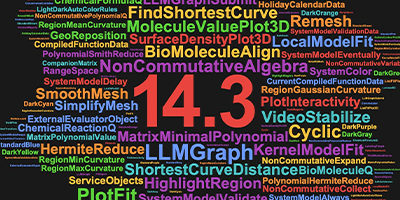Wolfram Data Summit 2016
Wolfram continues to be at the forefront of data science innovation. We invite you to check out the latest here.
This past September, we hosted our annual Wolfram Data Summit in Fairfax, Virginia. Over the past seven years, the Data Summit has come to occupy a central place at the nexus of data, computation and business. This high-level gathering of data innovators brings together people from many backgrounds and provides them the opportunity to share their challenges and breakthroughs in analyzing, managing and disseminating data.
With its emphasis on cross-pollination, the Wolfram Data Summit has emerged as an exciting place to share insight into the subtle differences and unique challenges presented by data in different domains. New and unexpected points of commonality emerge from these conversations, allowing participants to trade solutions to emergent data problems.

This question of what to do with data was taken up by Lei Wu (Ancestry.com) and Cinzia Perlingieri (Center for Digital Archaeology), both of whom curate large data collections that preserve cultural memory. At Ancestry.com, Wu and his team of data scientists are reimagining digital genealogy as social networking. We use Facebook for friends and LinkedIn for professional relationships. What if we had a network—what he calls a “big tree”—for our shared genealogical history as well? This big tree engages users in the process of turning data into knowledge.
Like Wu, Perlingieri emphasized the importance of combining human insight with machine learning when it comes to doing things with data. Perlingieri and her team are searching for scalable methodologies that preserve cultural heritage. “We need a redefinition of data as a concept inclusive of alternative narratives and community-driven contributions to heritage,” she said.
Though Ancestry.com and the Center for Digital Archaeology serve very different clienteles, they share a user-focused approach to data curation and interpretation. Users create knowledge by interacting with archives, generating new connections between data elements in the process. These types of connections were explored by each of the Summit’s presenters, including Anthony Scriffignano, chief data scientist at Data Summit co-sponsor Dun & Bradstreet, whose talk delved into some of the “Things We Forget to Think About.”
Because we recognize the promise of computational knowledge for every industry, we will continue to expand the Wolfram Data Summit. The Wolfram Data Summit develops understanding of data at the level of software, hardware and technical processes. But at its core, the Wolfram Data Summit is about how we create and structure data, what kinds of insights can be derived from it and how we apply computational thinking. What kind of computational thinking do professionals use in different domains? How might computational thinking be applied across those industry boundaries? As the Wolfram Data Summit turns eight, we continue to search for answers to these questions and more.
Watch more videos from the 2016 Wolfram Data Summit, including Stephen Wolfram’s keynote address, here.
This post has been updated to include video of Anthony Scriffignano’s talk.



Comments